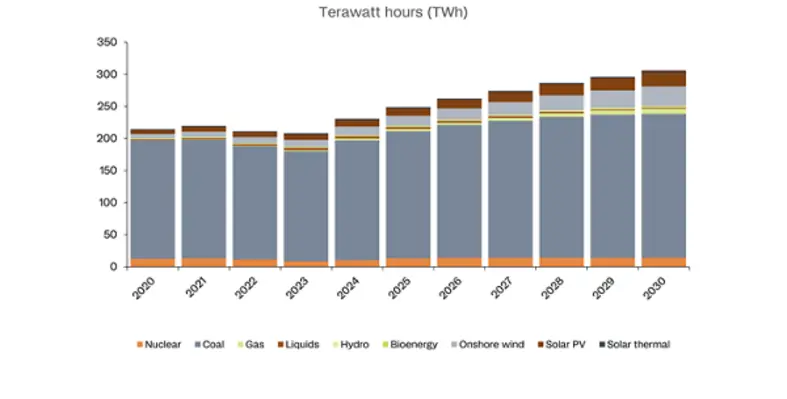According to research by Rystad Energy, there are challenges ahead for South Africa’s decarbonisation efforts as renewable power capacity is expected to fall short of the 2030 target
The independent research and business intelligence company has indicated that renewable energy will account for just 20% of the country’s power mix by the end of the decade; someway short of the 41% target.
The country envisioned meeting this goal by increasing onshore wind and solar capacity. While both have shown significant growth in recent years, rising demand coupled with load shedding has seen the country rely more heavily on trusted fossil fuel alternatives, with new additions to its aging coal power infrastructure common.
By 2030, power generation is expected to increase by more than 40% in the country, reaching approximately 300TWh. Although investment in renewable energy capacity is increasing, coal continues to dominate the country’s power mix, accounting for more than 80% of electricity generation.
"Renewables and clean technologies hold the potential for reshaping South Africa’s energy landscape, contributing to a more sustainable future. By diversifying power generation and addressing immediate challenges, the country can pave the way for a resilient energy sector that aligns with its environmental goals and ensures a brighter future. But South Africa faces an uphill battle and significant hurdles in achieving its goal," commented, Nivedh Das Thaikoottathil, renewables and power analyst at Rystad Energy.

This is not to say the country has not made notable efforts to meet the 2030 target. Indeed, its Renewable Independent Power Producer Program (REIPPP) has been instrumental in driving renewable energy development according to Rystad, and the country is currently reviewing applications for substantial capacity of solar and onshore wind projects, many of which include battery storage. In addition, to facilitate the deployment of renewables, the country is working hard to improve its transmission infrastructure, and the Government has approved a bill that promotes private generation projects and power trading with the hope of reducing dependence on Eskom and encourage participation from the private sector.
While renewable growth does hold promise, the country is unfortunately hindered by its reliance on coal power. With many coal power plants exceeding their projected 40-year lifespan, there is a significant risk in terms of energy security (which is contributing to load shedding) and decarbonisation. While the country hopes to reduce its greenhouse gas emissions to between 350mn tonnes and 420mn tonnes of carbon dioxide equivalent by 2030, its coal fleet is expected to expand with the emergence of new units.
Rystad has indicated that, to redress this issue, South Africa should consider the role of gas in its energy mix more seriously and understand that battery storage is crucial to meet energy demands and decarbonisation goals.
The report concluded, “With coal power's limitations becoming increasingly evident, the integration of renewable energy sources, complemented by flexible gas power and battery storage, is emerging as a viable path forward. As South Africa aims to diversify its generation mix and reduce greenhouse gas emissions, proactive measures to improve transmission infrastructure and facilitate project authorizations will be essential.”












